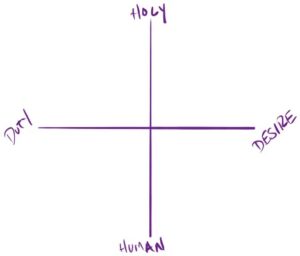Unravel leaders often get asked for advice from men striving to figure out what to do in the next season of their lives.
Honestly, advice is something we hesitate to give. Instead, we use questions like these to help men make better decisions overall. We do this by fostering a life-giving quality known as discernment.
Discernment is not as necessary when we’re deciding between good and awful opportunities. “I’m 34. Should I take the job or should I keep living in my parents’ shed?” (You should probably take the job).
Developed and precise discernment is most helpful when we have to choose between good and good options. It helps us identify what might be best among decent alternatives. It becomes even more urgent when the choices constitute a major change.
How Can I Know if This Big Move is the Right Move?
There are several ways to raise your discernment game and feel more confident in the decisions you make in life. But we’ve found a tool that quickly helps set a direction for the decision. Some men report that this tool was the only help they needed to move forward without regret.
Here’s how it works: Draw the grid below on a piece of paper or digital note, and plot each option on the grid.

X Axis: Does the option occur to you as more of a duty you believe you have to perform or a personal desire? Does it seem more like your answer to someone’s expectations or responding to your own passion?
Y Axis: Does the option occur to you as more human in nature or holy? In other words, is the motivation more temporary or more eternal? More about you or more about God?
Note: Neither end of either spectrum is “good” or “bad”. Don’t moralize it. There are options that are extremely “human” and “dutiful” that might seem wise.
However, whenever an option plots high in “desire” and “holy”, you might’ve found your answer.
Putting This Into Practice
This grid helps see what kind of choices you’re facing. It may tip the scales. We’ve found it’s also a great way to discuss the changes with someone you trust — maybe even someone who would be impacted by your choice.
Now, these aren’t the only questions you should ask. But this process may lead to a deeper set of questions that will help you make a better decision.
If you are still struggling to know what to do, if you’re stuck at a fork in the road, let’s explore another principle that has served men over and over again in life and leadership:
The “right” way is almost always the simplest and hardest.
If one choice seems easier, but requires mental gymnastics to justify it or make a case for it, it’s probably not the best thing for your future.
Truth is, you’re probably avoiding what you already know is the best route to take. It’s simple. It will spare you so much confusion and explaining and pain in the long run. But it will initially be tough. Firing them will be tough. Asking for a raise will be tough. Telling them about the addiction will be tough. Changing careers will be tough. Staying in the marriage will be tough.
Do it anyway.


